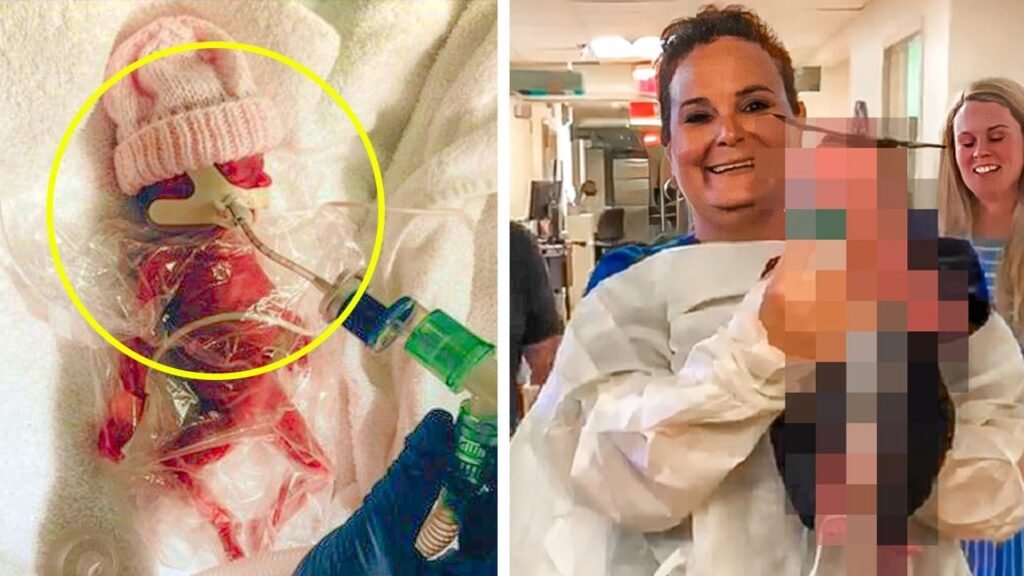<p>Robert and Molly Potter were desperate as they searched for a hospital to care for their soon-to-be-born premature son, Cullen. Sixteen institutions refused to accept such a risky case, but the Potters knew deep down that this was a mistake.</p>
<p>For Robert and Molly, both 32 and living in Pensacola, Florida, the road to parenthood hadn’t been easy. The couple had a seven-year-old son named Kaden, but Molly had also suffered two miscarriages while trying to add to their family.</p>
<p>In 2018, Molly discovered she was expecting again. However, this pregnancy quickly proved to be just as fragile as the last two. She started bleeding three months into gestation, and her doctors prescribed bed rest due to her history of miscarriages. Unfortunately, her condition only worsened.</p>
<p>Not only did the bleeding increase, but Molly also began experiencing labor pains far too early. At that point, she hadn’t even reached the 24-week benchmark in her pregnancy—a critical milestone. According to doctors, after 24 weeks, a baby’s chance of survival increases significantly. Before that point, the chances were slim, with only a 2% survival rate due to underdeveloped vital organs.</p>
<p>Molly recalled to <em>Inside Edition</em>, “I was like, he can’t come yet. He’s too small. We didn’t know if he was going to live or die. Every day was waiting to see if we could make it to the next day.”</p>
<p>Adding to their stress, the Potters’ local hospital informed them that if Cullen was born before 24 weeks, they would be unable to save him. This grim news spurred Robert into action. He began contacting other healthcare facilities in search of better options.</p>
<p>Robert called more than a dozen hospitals, asking, “Can you help babies born under 24 weeks?” But he was rejected 16 times. Each institution cited the high risk and low survival rates as reasons they couldn’t take the case.</p>
<p>However, Robert refused to give up. Eventually, he received an encouraging response from the University of South Alabama Children’s and Women’s Hospital. Although the facility was 70 miles from the Potters’ home, the staff assured them they could admit Molly and perform the emergency C-section necessary to deliver baby Cullen.</p>
<p>According to Renee Rogers, manager of the hospital’s neonatal intensive care unit (NICU), “We’ve helped small babies born at 21 or 22 weeks for over a decade. The preemie survival rate for babies that age is 68%—much better than the 2% odds quoted to the Potters by other hospitals.”</p>
<p>With hope restored, Robert and Molly drove to Mobile, Alabama, where Molly was admitted to the hospital. Doctors observed her condition for five days and discovered a life-threatening complication: Molly’s placenta had detached from her uterine wall. This detachment could have caused her to hemorrhage and cut off Cullen’s oxygen supply.</p>
<p>Despite Molly’s protests, the medical team had no choice but to perform an emergency C-section.</p>
<p>All of the Potters’ fears were momentarily eased when Cullen entered the world at just 22 weeks old. He let out a cry that Robert described as “the most beautiful sound ever.” He turned to Molly and reassured her, saying, “That’s our son. He’s going to be okay. He’s going to make it.”</p>
<p>But little Cullen’s battle was far from over. Weighing just 13.9 ounces, his organs and skin were so fragile that he couldn’t be held for four weeks after his birth. Doctors also warned the Potters that if Cullen survived, he might face lifelong disabilities.</p>
<p>Despite these challenges, the Potters remained determined to fight for their son. The nurses and doctors at the NICU provided exceptional care, while Molly coped with the emotional toll of the situation. “What kept me going was just knowing that Cullen needed me,” she shared with <em>The Washington Post</em>.</p>
<p>After six long months of commuting from Florida to Alabama to visit Cullen in the NICU, the Potters finally received the news they had been waiting for—Cullen was strong enough to go home. Although he would require additional oxygen for several months, doctors expected him to grow up healthy.</p>
<p>To celebrate Cullen’s incredible journey, the NICU staff organized a special “graduation” ceremony. Cullen’s primary care nurse, Jewel Barber, carried him through the ward in a tiny cap and gown, which Molly had purchased from Build-A-Bear Workshop.</p>
<p>On August 21, 2018, Molly proudly dressed her son for the ceremony, grateful to the staff who had saved him. “To see him look like a real baby and act like a real baby and being able to go home—it just didn’t feel real,” she told <em>Inside Edition</em>.</p>
<p>Now, with their family finally together, Robert and Molly have made it their mission to inspire other parents in similar situations to never give up hope. Molly encourages other parents, saying, “Cullen has proved the technology is out there, the resources are out there. We encourage other parents in our position—high risk or not—to definitely get with your hospital and find out what they can and can’t do.</p>

16 Hospitals Turned This Premature Baby Away. Then The Parents Realized Doctors Made The Wrong Call
-
by thebuzzly

- Categories: English Story
- Tags: babiesBabybaby parentsdoctorsdoctors mistakesheartbreakinghospitallife storieslife storymysterious storiesMysteryparentspremature babyreal life storyshort filmshort storiesStoriesstories from lifeStorystory timestorytimetrendsunexpectes discoveryunusual eventsviralwrong call
Related Content
The Man, the Mystery, and the Cable: A Medical Case That Stunned a Hospital
by
thebuzzly
10/06/2025
A Nurse, a Photograph, and a Lifelong Memory: Amanda’s Search for the Woman Who Comforted Her
by
thebuzzly
08/06/2025
A Gallon of Kindness: A Boston Officer’s Quiet Act of Compassion Amid Chaos
by
thebuzzly
08/06/2025